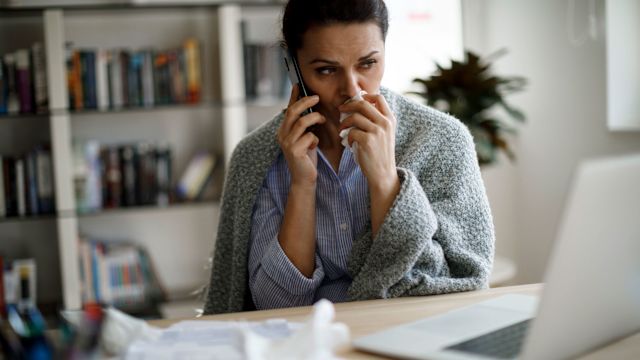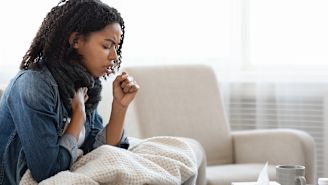Updated on September 30, 2024.
Next time you get a sore throat and sniffles, here's how to avoid can't-get-out-of-bed misery later: Stay home.
Clocking into your job when you don’t feel well could be dangerous to others. In today’s viral world, with diseases like COVID, respiratory syncytial virus (RSV), and the flu circulating, going to work while sick can risk infecting colleagues, clients, and customers.
And research shows that workers who go in sick are much more likely to develop more serious illness down the road. Working while ill also negatively affects your productivity.
Here’s what we know about the effects of presenteeism, or going to work while ill, along with some tips for staying healthy.
Infecting and affecting others
Going to work with any kind of infectious disease is called contagious presenteeism. In a 2019 narrative review published in the British Medical Bulletin, researchers looked at a number of studies and data, and termed contagious presenteeism a public health hazard. It’s especially dangerous if a person works with vulnerable people who may have lowered immune systems.
The lowered work performance that comes from presenteeism can affect everyone. If you go to work while sick and can’t keep up with your work, you may increase the workload (and stress) experienced by your colleagues.
Productivity
When a person is sick, their ability to react quickly to demands gets lower, and the amount of cognitive effort or brain strain needed to accomplish job duties gets much higher. Presenteeism can lower your work productivity by an average of 20 percent. Work productivity may be even more affected if your job requires a lot of mental effort.
Workplace safety
Working while ill can make you tired and more likely to make mistakes and poor judgment calls, to overlook things, and to forget things. It can also make you less physically able to do work tasks because fatigue and illness can affect your motor system.
If your job is especially reliant on quick thinking or the ability to adapt to new situations—and if worker or consumer safety depends on these abilities—it’s best to stay home and rest rather than put yourself or others at risk.
Your long-term health
Researchers found that presenteeism can be a serious risk factor for further health issues. For example, people who go to work while ill are at a greater risk of having future health problems or needing to take extended sick leave for a longer-term illness.
Some of the studies the researchers examined showed serious problems could result from presenteeism, with one showing that it could double an employee’s risk of serious health issues like heart attacks. And they also found that not taking time off to recover from illness could contribute to stress and burnout, which can then raise the risk of serious health issues like depression, heart disease, and a weakened immune system.
Working remotely while sick
In recent years, many employees have turned to remote work or work remotely on a hybrid basis (going into the office some days, and working from home on other days). Many of these people find themselves working from home—even while they are sick.
The 2019 review notes that one ongoing issue with working from home is the expectation or pressure to be “always on” or available to work. In fact, some people even work while they’re hospitalized—and the researchers found that this kind of constant work culture can delay recovery.
Researchers continue to actively gather data about the possible negative consequences of working remotely while sick.
One exception to the rule (sometimes)
One positive finding of the review was that in certain cases, working while healing—rather than taking short- or long-term disability—could help take a person’s mind off their illness, raise their morale, and make them more likely to finish long-term treatment programs. However, this was only the case if their work environment was flexible and supportive throughout the process.
Healthy workplaces
In ideal situations, a workplace should proactively manage presenteeism by following policies like those outlined by the Centers for Disease Control and Prevention (CDC). These include:
- Counseling ahead of time about how to manage your work situation if you’re feeling ill, including reporting any potentially serious infectious diseases
- Providing adequate sick leave
- Helping with access to lab testing if you need to know what illness you’ve got
- Providing access to treatment
These and other health benefits, programs, and management policies can help employees be healthier, more productive, and less likely to take future sick days. Unfortunately, not all workplaces are able to provide these benefits.
Personal preventive measures
So, what can you personally do to take care of yourself? Here are some healthy tips for preventing illness.
Work toward an overall healthy lifestyle
That means eating a nutritious diet, getting plenty of physical activity, and finding healthy ways to manage stress.
Practice good hygiene
When bugs are circulating (and even when they are not), it’s always good practice to wash your hands regularly and avoid touching your face. If certain infections surge in your community, it’s also smart to check and follow any current CDC-recommended social distancing and masking guidelines.
Stay up-to-date on vaccinations
These may include:
- An annual flu shot
- The COVID vaccine
- The Tdap (for tetanus, diphtheria, and whooping cough) or TD (tetanus and diphtheria) vaccines or booster, if needed
- All additional age- or travel-related recommended vaccines, which can include vaccines for respiratory syncytial virus (RSV), shingles, or pneumonia
Home treatments
If you come down with an illness, consider the following.
Try evidence-based home remedies
Using a humidifier, drinking plenty of water, and taking over-the-counter medications are among the proven ways to find relief from cold and flu symptoms. You could try old-fashioned chicken soup, too. Some studies suggest it may help a cold.
Get adequate sleep
A good night’s rest can boost your immune system and help you recover from being sick. Most healthy adults should shoot for seven to nine hours each night.
Monitor your condition
If you have COVID especially, make sure to carefully watch your symptoms. You may wish to get a pulse oximeter to monitor the oxygen in your blood and talk to a provider about how to interpret the readings. Be sure to get immediate medical attention if you have trouble breathing, persistent pressure in your chest, confusion, or changed skin tone.
Protect loved ones
Be sure to isolate if you can, especially if you’re infected with COVID. Wear a mask, try not to share household items, and each day clean surfaces that you often touch, like doorknobs or light switches.
And, if at all possible, try not to work while you’re sick. Presenteeism is generally unhelpful for everyone and could cause serious harm. Invest in your long-term health and the health and safety of those around you by taking gentle care of yourself and allowing yourself to heal.






